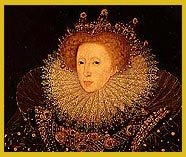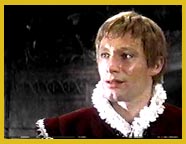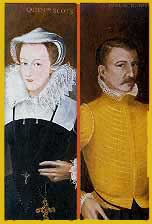|
|
The title of this film being clear to the
inhabitants of the British Isles can easily puzzle a common soviet man.
Anyone can't understand at once that "Mary, Queen of Scots" is Mary Stewart
herself! (The last syllable is stressed) Since Schiller's tragedy image of
a woman seized with passion, making plenty of mistakes but struggling for
justice and at least dying by hands of executioners has been in harmony with
the tradition of Russian classical literature.
A struggle for power 400 years ago in England,
court intrigues, English, Scottish, French kings�For all Englishmen and
Scots these facts contribute to their history as Ivan the Terrible and
Peter the Great contribute to our own. I'm not sure more than 20 percent of
our countrymen are aware of the fact that Englishmen for the most part are
Protestants but Scotchmen are Catholics. What's the difference between them?
What haven't their shared with each other?
However a powerful queen deprived by beauty
and disregarded by real men goes into mortal combat against a rebellious
belly, a fatal woman who has ruined lives of the best male representatives,
- that's great! Here are blood flows and horrors! Generosity and meanness.
Love and abhorrence. Life and death. And that all corresponds to our Russian
way of thinking!
It's probably the main reason for the reviewed
movie to be not televised in our soviet times. And still no one is capable
to find it on the Russian video market. This film is undoubtedly considered
to be of high quality. All the historical events are given without any
obvious "bend" (as it's generally accepted to say nowadays: "the authors
take their weighted stand"). Excellent costumes, producing, shooting, acting
and music - everything is on the highest level!
But�this "weighted stand" emasculates the
holy of holies for the Russians - I mean passion. Vanessa Redgrave is
unconditionally a brilliant actress, a real superstar, a beauty but she
isn't Mary Stewart, not Mary Stewart WE APPRECIATE AND LOVE!
Her role specialization incorporates heroines
with rich inner world and exceptional intellect (refer to "Agatha" review
for instance), reserved expressing their own feelings. This dramatic data is
seldom embraced by the author's conception of the concerned movie. On the
screen she runs through all Mary's history since her youth up to her death.
However in the face of crucial moments Vanessa resembles more a "brood hen"
than a passionate strong-willed woman. Obviously the only sign of love for
her (on the assumption of the emphasized dramatic type) is a loss of mind.
As a matter of fact she seems to us fighting for a throne against the
English queen being constantly involved in this struggle by the ambitious
men.

Elizabeth by Glenda Jackson is magnificent.
For the Russian viewer this role may be a real discovery. We fancy this
image as of a certain tyrant-despot who is anxious about preservation and
strengthening of his power only. And on the screen she is represented as a
woman. It turned out that she had had at least one or may be more lovers
even. It's quite clear why she can't bear "that" Mary: you can't even merry
anybody and on the contrary there are three husbands, a son ( Iakov the 1st ,
the king of England to be after Elizabeth) and at least - there are "piles"
of men�And still claims the throne of England! Our Russian czarina Elizabeth
(a real one, not performed by Vanessa Redgrave in the movie "Young Katherine")
will immediately strangle such a rival and not imprisoning her for 18 years.
By the way the imprisonment tenure in the movie is evidently reduced.
Nevertheless it seems so.
Men in "Mary�" play second fiddles. But their
acting is also splendid. Dudley (D. Massey), Richio (I. Holm), Bothwell
(N.Davenport) are brilliant. And of course no one else but Timothy Dalton
shines like a brilliant among this dramatic success. I'd run risks to assert
that's the best acting in this film. Better than women key-roles even!
Tim plays the role of Mary's second husband
- Henry Darnley. 5 years had passed since the death of her first husband
(king of France) and her second marriage and 4 of them she spent in Scotland.
And in the course of those years a search for a royal husband for the queen
of Scotland and Ireland, ex-queen of France (for 2 years) and also the
"legal" (as she considered herself to be) queen of England throughout the
whole Europe was being conducted. Elizabeth, numerous diplomats, royal
individuals and of course Mary herself took part in that quest for a
husband.
Most of all Mary was interested in the
variants of getting married with present and future kings: a) of Spain
(15 years old Carlos); b) of France (13 years old Karl the IX- th). However
the two- years long negotiations resulted in nothing. Then Elizabeth -the
implicit leader in such love affairs - started proposing kinless Robert
Dudley, her quasi-lover, to her "dearest sister"; by the way the above
"process" didn't gladden Robert himself. James Melville on Mary's
instructions found young Henry Darnley possessing no dignities except his
appearance and parentage (great-grandson of Henry the VIIth). But the film
indeed represents Elizabeth to sanctify Darnley's matchmaking by herself.
If Mary were in her senses the last variant
would have been rejected as the previous ones. But� Obviously it's high time
(she is already 23) to get married and Mary fall in love with this complete
nonentity raising the tragedy curtain that will immortalize her name.
At first Henry Darnley doesn't believe in
this fortune that has come like a bolt from the blue. He is eager to jump
with joy, to share his fortune with everybody. He scarcely loves Mary. He
probably loves her attitude towards him. Mary being Catholic to her
convictions has to withstand strong resistance of her brother-in-law James
and her closest brothers-in-arms (all of them are Protestants) for the sake
of her first genuine love. She brakes through and gets married with Darnley
(Catholic also). But he isn't able to understand it. He is in raptures. He
can't realize with all his wretchedness that he is not the king but the
queen's husband only. He wants to exert regal power possessing nothing. No
will, no intellect.
Very soon Mary saw the light and cordially
ceased to love him. It's a pity that the movie can't reflect all these
inward revolutions of the main heroine as agonizing suspense, passion
explosion, abrupt coolness and then boundless love towards Bothwell. Child
expectation postpones her official divorce with Henry. She spends her time
with Riccio - a musician and Pope's agent appointed by Guises to keep an eye
on her on leaving France.
Henry isn't aware again of what has happened.
Why is he being scorned? As a matter of fact he has done nothing prejudicial.
He is as he has been before. At least he isn't guilty that Mary has mistaken
in him! The scene where Mary openly announces to him - an imbecile that
"HE HAS NO RIGHT TO DISCUSS HER" (!!!) and he murmurs in a trembling voice:
"I'm the last, I'm the last" is considered to be a real culmination. For
Darnley it's the moment of truth. Watching this takes your breath away. One
feels pity for Tim's character. Dalton's magic bewitches. It seems for a
moment that a helpless person has been offended�

When Dalton leaves whispering "I'm the last"
- all magic recedes. Of course he is "the last"! Whom else can we call him
incapable even of elementary self- appraisal? The moment of truth is
undoubtedly only the moment for Henry Darnley. Her enemies pick up a rotten
apple thrown by Mary. The lords - Protestants make Darnley abandon all his
authorities in their favor. Richio's death sentence is their payment for
this. What a range of feelings is there on the face of our hero: the blind
fear, the hope of slipping out, the revengeful malicious joy, the joy of
being rescued. Tim is incomparable!
The whole gang before Mary's eyes executes
Richio's death sentence. Henry "displays his character" but in a second he
starts trembling and crying weakly (as if saying: "What have I done?"). When
Mary (deliberately helpless) presses herself close to him he takes it in a
good faith. A sort of: Darling, I've been blind but You've forgiven me and
we'll forget everything!
No, this can't be forgotten! A new revolution
lingers in her mind. Bothwell who has taken note of Mary in France "flies
round like a hawk". She plunges into her new passion and Darnley isn't long
for this world anymore! Bothwell won't stop on nothing. He isn't a palace
intriguer but a warrior. "A real man" - that's the way we'd have called him
nowadays. His passion and intellect are more than a match to Mary's love and
wit. Finally she's got not only a powerful enemy (Elizabeth) but a faithful
friend also. But it's too late! Bothwell is alone but for the enemies who're
very strong and there are plenty of them!

Blood of her murdered husband will follow
Mary through all her life as well as the "Bloody boys" of Boris Godunov.
Speaking properly the death sentence passed on by the English Lord Committee
and approved by Elizabeth that "took" Mary's head had been passed on for her
complicity in the premeditated murder of the "legal" king of Scotland -
Henry the Vth.
In conclusion I can't help quoting a huge
extract from the preface of the book "Mary Stewart" by Stephen Zveig:
"Vital drama of Mary Stewart is considered by
right to be the classic, the best-known example of the inexhaustible charm
of mystery which comes from the historical problem now and then. No other
woman in the world's history has been honored with such a rich literary
material: dramas, novels, biographies and discussions. For three centuries
she has been disturbing the novelists, attracting the scientists and until
now her image worries us with a relentless power trying to obtain new
reproduction. Since everything intricate by its nature is drawn towards
clarity, everything dark has a bent for a light.
But all the attempts to depict and to
interpret everything mysterious in Mary Stewart's life are as so
contradictive as numerous: there can hardly be a woman pictured so
differently - sometimes a killer, sometimes a martyr, an unskillful
intriguer or a saint one. However the contradiction of portraits of hers is
caused not by scarcity of the information that has reached our ears but its
embarrassing abundance. The retained documents, protocols, acts, letters and
articles are estimated at thousands�And the more conscientiously one studies
the sources the more one makes sure of an uncertainty of any historical
evidence at all�
Taking Mary Stewart as an example one can
observe monstrous divergences of ways the same event being described in
annals of the contemporaries. Each "yes" confirmed by documents withstands
"no" also confirmed by documents; every accusation is opposed to apologize.
The truth is so mixed up with the lie and facts with fiction that one can
easily ground any point of view. If You wish to prove Mary's connection with
her husband's murder so tens of attestations are at Your service; and if You
prefer to stand up for the contrary assertion You can rely on attestations
again, all paints for any portrait of hers are usually merged beforehand�"
Read Zveig! Read Schiller! Watch the film
"Mary, Queen of Scots" and enjoy acting of Timothy Dalton!
�.�., 1999


Order in Amazon
[Genre]
[Character]
[Chronology]
[1960-70-th]
[1980-th]
[1990-th]
|
|
